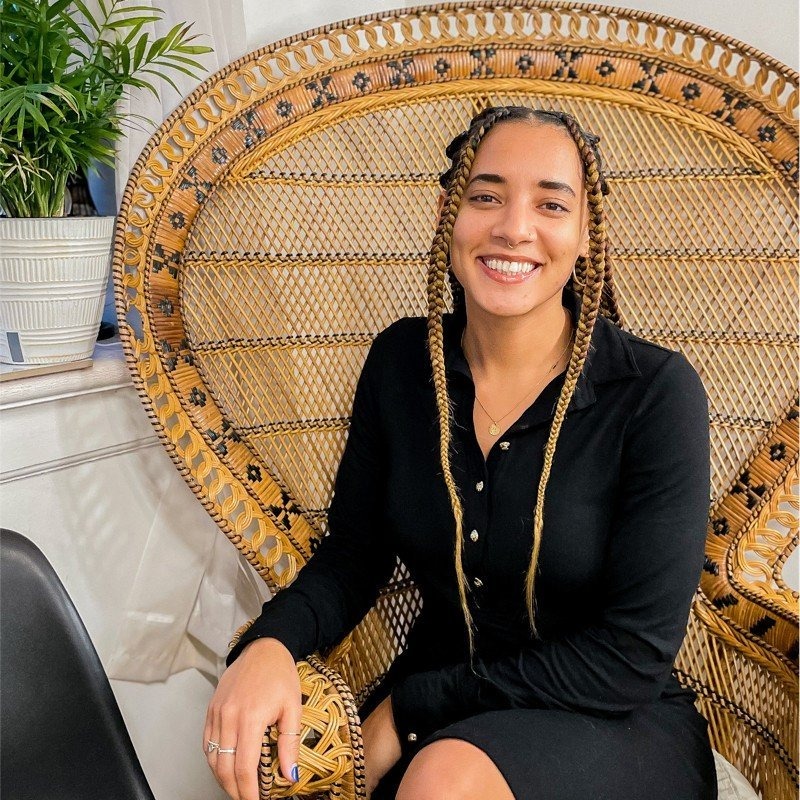
Championing maternal health: Sequoi Phipps-Hawkins advocates for reproductive justice in Richmond
At a Glance: Sequoi Phipps-Hawkins, a communications director and community-based doula in Richmond, Virginia, is dedicated to addressing disparities in maternal healthcare. Through her work with the nonprofit Birth in Color, she combines hands-on care with advocacy for reproductive justice, focusing on improving outcomes for women of color and advocating for systemic change in maternal health services.

In Richmond, Virginia, 29-year-old Sequoi Phipps-Hawkins is a dynamic advocate for reproductive justice and maternal health.
Dedicated to delivering essential and high-quality healthcare to women of color, Phipps-Hawkins excels in her dual roles as the director of communications and marketing and a community-based doula at the nonprofit, Birth in Color.
“It's not just theoretical; it's about making a tangible difference in our community, working one-on-one with families,” Phipps-Hawkins said. “Knowing that we have poor maternal mortality and maternal mental health drives me to find solutions.”
Despite significant healthcare funding, the U.S. struggles with rising maternal mortality rates and challenges in maternal mental health. National maternal death rates have nearly doubled between 2014 and 2021, going from 16.5 to 31.8, according to a study published in March in the American Journal of Preventive Medicine.
Although she did not have any medical training, Phipps-Hawkins was deeply drawn to reproductive health and justice, motivated by the stark disparities in maternal care. Her commitment is evident as she navigates roles that intertwine advocacy with hands-on care for equitable maternal health.
Birth in Color, a reproductive justice and maternal health organization, is not just a workplace for Phipps-Hawkins. It’s a platform where she expands doula support with essential community resources, addressing broader social and health issues.
As the communications and marketing director, Phipps-Hawkins shapes the organization's outreach and programming. She engages with the community, using direct feedback to tailor resources and programs. Her day-to-day responsibilities include facilitating surveys and discussions to gauge community needs, which guide the development of new initiatives like childbirth education and lactation clinics.
"It's rewarding to ensure our resources truly support the reproductive health journey of those we serve,” she said. "It's about making a real difference in small, yet significant ways."
Serving as a full spectrum doula, Phipps-Hawkins enhances traditional prenatal, birth, and postpartum support by integrating access to essential community resources. Unlike standard doulas who focus primarily on the birthing process, community-based doulas like Phipps-Hawkins adopt a holistic approach. She ensures her clients' overall well-being by addressing a wider spectrum of social and health needs.
In this role, Phipps-Hawkins connects clients to these crucial resources. Her days are packed with activities including coordinating prenatal visits, discussing birth plans, and creating responsive health programs. She meticulously addresses her clients’ immediate health needs and also the broader socio-economic factors that affect maternal health.
Virginia's recent legislative developments have made doula services more accessible. The state General Assembly recently passed two identical bills, SB 118 and HB 935, requiring health insurers to cover essential doula services. In April, Gov. Glenn Youngkin signed those bills.
“We're one step closer to private insurance covering doula services,” Phipps-Hawkins said. “But for now, Medicaid covers these services. The doula gets paid through Medicaid, and the client doesn't have to pay anything at all.”
Besides Medicaid, Phipps-Hawkins said the organization also uses community funding and a sliding-scale payment method based on household income. This ensures affordability and accessibility for everyone, according to her.
Phipps-Hawkins's journey into reproductive justice was sparked by personal stories of disparity from her loved ones when accessing maternal care. Witnessing the differing maternity experiences between her friends of color and their white counterparts, she felt compelled to act.
"Seeing people I personally knew receive different levels of care based on their race really opened my eyes to the disparities in maternal healthcare, and it wasn't okay," she said.
Black women are three times more likely to die from pregnancy complications compared to White women, according to CDC. In Virginia, where nearly one-fifth of the population is Black or African American, over 20% of all births in the state are by Black women.
Through her advocacy, Phipps-Hawkins pushes for policy changes and enhanced training for healthcare providers to address these disparities. By focusing on those most vulnerable, she believes that maternal care standards can be raised for everyone.
“She’s done a lot of good work for the reproductive justice movement, going above and beyond.” said her colleague and doula Dana Williams. “Her impact will last for generations.”
Williams described Phipps-Hawkins as a “Type A personality” who is a highly organized individual and a great innovative thinker. Phipps-Hawkins is also a great researcher and a great writer, according to Williams.
“She's created a wheel for Birth in Color that will be able to roll for years and generations to come to assist other women that are coming behind us and associating themselves with the reproductive justice framework,” Williams said.
Beyond professional accomplishments, Sequoi's work significantly shapes her personal identity and worldview. The advocacy skills she hones on the job spill over into other aspects of her life, empowering her to stand up for herself and others, no matter the setting.
"Working one-on-one with clients teaches me the value of small-scale impacts, similar to the importance of voting in local elections,” she said. “It's about making a real difference in small, yet significant ways.”
Feature Image Credits: iStock illustrations
Post a comment